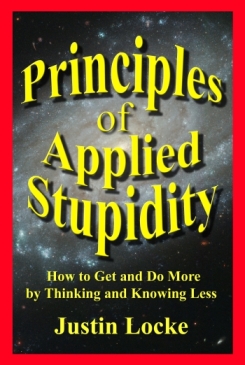My brother the locksmith is always talking about fractals of thought (i.e., repeating patterns), and today I came across a very good illustration.
When I wrote Principles of Applied Stupidity, I sincerely believed that I was doing something that no one else was doing. To a certain extent, I was right.
But then the other night, I was watching The Daily Show with Jon Stewart, and this guy Atul Gawande came on talking about a book he wrote called The Checklist Manifesto. Basically, he pointed out that adding checklists to surgical procedures eliminated a large percentage of errors. The real thrust of the book though, was accepting the fact that were not perfect and that we make mistakes, and accepting our imperfections is key to creating fixes which make for better results. This is very much in line with Principle of Applied Stupidity #11, which is “embrace your inner idiot.”

So anyway, the next day I googled “checklist,” and I ran into an article written by Susan Spencer of CBS news:
Make No Mistake: To Err IS Human
What really struck me about the article was that, along with all sorts of classic blunders, it referred to four events that I used in my own book to illustrate my points: one) the discovery of penicillin was a mistake 2) the discovery of Viagra was largely a mistake, 3) Thomas Edison failed much more than he succeeded and 4) the accidental discoveries of early explorers looking for one thing and finding America instead (they referred to Hudson and I refer to Columbus, small difference) (Note, both the Fleming/penicillin story, Thomas Edison, and Early explorer Columbus are referenced in my Chronicle HD TV appearance from April 2009!)
Then another thing popped up at me. This CBS news article referred to check lists being a wonderful way to eliminate errors in surgical procedures (as mentioned in NE Journal of Medicine). And this article was written almost a year ago, long before The Checklist Manifesto was published.
While I could easily become paranoid and think in all kinds of plagiarism is going on here, I really think that there is instead a kind of “thought fractal.” What I mean by that is, the goal and intention that I had in mind in writing Principles of Applied Stupidity is not mine alone. And that’s a good thing, because I certainly can’t do this all by myself. What is happening I think is that we are experiencing a “push back” from many quarters, of the unreasonable expectation that we should drive ourselves to greater and greater levels of achievement and perfection. I think this collection of articles and books is the beginning of a new trend towards accepting what we are as we are, as imperfect beings.
And I think that’s great news.
Some books about the power of stupidity that I discovered:
Book: "Why We Make Mistakes" by Joseph Hallinan
Book coming soon: Brilliant Mistakes by Paul Schoemaker
